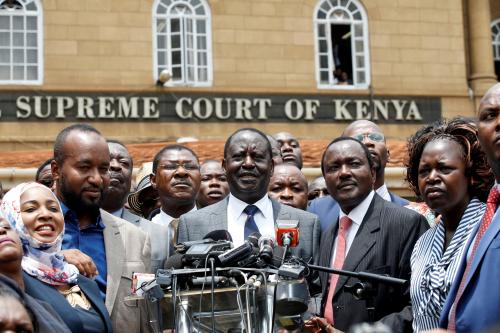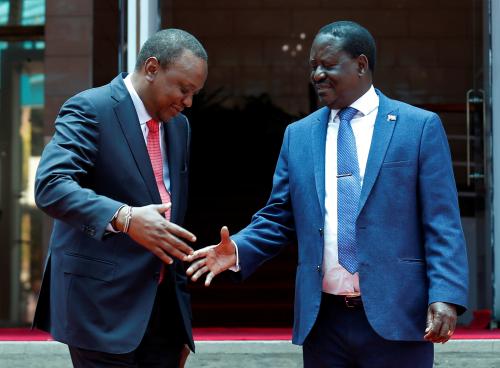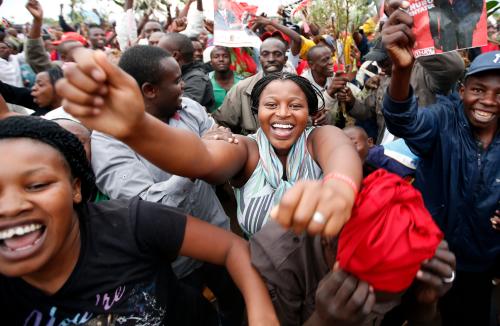“A declaration is hereby issued, that the presidential election held on 8 August 2017 [in Kenya] was not conducted in accordance with the Constitution [of the Republic of Kenya] and the applicable law rendering the declared results invalid, null and void. An order is hereby issued directing the first respondent to organize and conduct a fresh presidential election in strict conformity with the constitution and applicable election laws within 60 days of the determination under Article 143 of the Constitution [of the Republic of Kenya].”
Those are the historic words of the Supreme Court of the Republic of Kenya, as read by the Honorable David Maraga, CJ, chief justice and president of the Supreme Court, declaring “invalid, null and void” the “declared results” of the country’s August 8 presidential election.[1] This ruling nullifies the re-election of an incumbent president and orders that same president conduct a new vote within 60 days in “strict conformity with the constitution and applicable election laws.”
The 2010 Kenya Constitution and an independent judiciary
In 2010, Kenya adopted a new, progressive constitution that established a more decentralized governing system. In addition to the fact that the new constitution entrenched the concept of separation of powers with checks and balances, it significantly reduced the powers of what had heretofore been an imperial presidency. Significantly, the new constitution established what most Kenyans believe is an independent judiciary, capable of making certain that government activities are only undertaken strictly in conformity with the constitution. The August 8, 2017 presidential election represented an opportunity for the Kenyan judiciary to perform an important rule of law function and establish, once and for all, the critical role of an independent judiciary in governance generally and in the maintenance of law and order, as well as democratic living, in particular. Kenyans had, once again, as they did in the violent aftermath of the 2007 elections, come to a fork in the road: This time, however, they made the right choice and instead of opting for destructive mobilization, chose to allow the courts to resolve their conflicts. In doing so, they set the country on the road to peaceful coexistence and hopefully, sustainable economic growth and development.
The 2017 elections were declared peaceful and credible by the international community
The 2017 presidential elections were, by and large, conducted peacefully. However, there was an attack on the home of Deputy President William Ruto in late July 2017 and several people were murdered just before the election, including Christopher Msando, the head of information, communication, and technology at the Independent Electoral and Boundaries Commission (IEBC) of Kenya, the organization charged with conducting the elections. The official results showed that Kenyatta had been re-elected with 54.27 percent to main opposition leader Odinga’s 44.74 percent. In addition to the fact that the country’s top election official, Wafula Chebukati, had stated that the election was “free, fair and credible,” both the incumbent and several international officers—including former U.S. Secretary of State John Kerry—made similar claims.
The opposition cries foul and the president urges them to seek relief in the courts
Despite these pronouncements, Odinga argued that the election had been marred with irregularities and called for strike action to support his claim—that the election results were “hacked and rigged in favor of the incumbent” and hence, in his opinion and that of his supporters, were invalid. Although most observers stated that the casting of ballots went without any major problems, the opposition argued that the electronic transmission of the results was severely flawed and that errors introduced through the transmission process cheated them out of a victory.
Kenyatta, who had been declared re-elected, urged the opposition to avoid violent mobilization and instead, take their concerns about the election to the courts. Thus, on August 18, 2017, lawyers representing the National Super Alliance, the opposition coalition led by Odinga, filed a petition with the Supreme Court of Kenya.
Then, on September 1, the Supreme Court made its historic announcement.
The Supreme Court decision and why it matters
The ruling was historic and represents an important win for Kenyans and the rule of law. The Supreme Court’s ruling, which has not yet been released in full, supports the opposition’s claims. The court stated in its official opinion to Kenyans that the IEBC had “failed, neglected, or refused to conduct the presidential election in a manner consistent with the dictates of the Constitution.”
Notably, the six-judge Supreme Court panel found that Kenyatta and his administration had not engaged in any election malpractice. Instead, they found that the IEBC had engaged in various “irregularities and illegalities in the transmission of the results,” as well as other unspecified malpractices that seriously affected the “integrity of the poll.”
The decision, of course, was not the only important statement on the election: The candidates’ responses to it would determine how it would be received. To his credit, Kenyatta said that he would respect the Supreme Court’s ruling and called on all Kenyans to respond peacefully to the ruling, although he did express anger at the nullification of his win.
Odinga, of course, welcomed the ruling while some supporters of the president remain angry. It is very important for Kenyans to understand that the winner here is not the opposition but Kenya and its democratic institutions instead. A hundred years from now, this decision will be remembered, not because it granted the opposition another opportunity to capture the presidency, or cheated the incumbent out of a win, but because it reaffirmed Kenyans’ strong belief in constitutionalism, peaceful resolution of conflict, and the rule of law. What this ruling has done is save the country from unnecessary bloodshed, and place it on the path to peace and democratic governance. It has granted Kenyans a second chance to think about how they want to move forward and be governed—now is the time for Kenya’s political elites to seek to build political parties based, not on ethnicity,[2] but on those ideals that are cherished by all Kenyans: peaceful coexistence, opportunities for self-actualization, political and economic competition based on skill and merit (not on one’s ethnic origin), equality before the law, and peaceful resolution of conflict.
Where do we go from here?
Both parties are to be credited for recognizing the important role that the courts can play in resolving conflicts of this type: By allowing the country’s independent judiciary to resolve the matter, both Kenyatta and Odinga have made history, not just in Kenya, but in all of Africa. Perhaps other countries on the continent can appreciate the importance of the rule of law and why an independent judiciary is critical to the maintenance of a democratic system and peaceful coexistence.
Of course, both Kenyatta and Odinga, as well as their supporters, must now accept the Supreme Court’s ruling, move forward peacefully and engage in what, hopefully, will be a fair, credible, and peaceful new election. However, given the Supreme Court’s decision and the opposition’s claims of malpractices by the IEBC, it is important that the issue of the IEBC’s competence and independence be revisited before the new elections can take place.
The test of whether Kenyan’s political elites can provide the leadership needed to peacefully carry out the Supreme Court’s orders and select a government that will govern the country, enhance the country’s democracy, and provide an enabling environment for sustainable growth and development, is yet to come. The Supreme Court has performed its part and has done so superbly. Now, the government must do its own part—it must ensure that the new election is undertaken in “strict conformity with the Constitution and the applicable election laws.” Of course, the government cannot carry out this monumental task without the help and cooperation of the opposition.
Kenyans have long criticized their courts for kowtowing to the executive of the day. The present court was quite aware of the criticisms thrown at the Supreme Court in 2013 when it heard and decided a similar petition made by Odinga. This time, however, the court acted with a bold determination to function as an independent arbiter of justice. It made a ruling that will significantly affect the future of democracy and the rule of law, not just in Kenya, but also in Africa. The hope is that Kenyans, whether they are supporters of Mr. Kenyatta or Mr. Odinga, will see this ruling as the once-in-a-lifetime opportunity to build an effective governing process based on the rule of law. In doing so, their country will stand as a beacon of hope in a region ravaged by sectarian violence and undemocratic regimes, as well as join a growing number of African countries that are gradually developing and sustaining democratic systems of governance.
Endnotes
[1] General elections were scheduled in Kenya for August 8, 2017 in accordance with the Constitution of the Republic of Kenya, 2010, which requires that there be a general election on the second Tuesday in August in every fifth year. The main contenders for the position of President of the Republic of Kenya were incumbent President Uhuru Kenyatta (Jubilee Party) and opposition leader, Raila Odinga (National Super Alliance—NASA). The other candidates included Mohamed Abduba Dida, John Ekuru Longoggy Aukot, Shakhalaga Khwa Jirongo, Japhet Kavinga Kaluyu, Michael Wainaina Mwaura, and Joseph William Nthiga Nyagah.
[2] Ethnicity is an ever-present factor in Kenyan elections. For example, pre-election interviews of potential voters revealed that Kenyans from virtually all of the country’s ethnocultural groups indicated that they would only vote for a candidate of their own group because they “trust him.” President Kenyatta is Kikuyu and opposition leader Odinga is Luo. Within Kenya, five ethnocultural groups—the Kikuyu, Luhya, Kalenjin, Luo, and Kamba—make up nearly 70 percent of the country’s population. The continued politicization of ethnicity means that an ethno-regional coalition can possibly and effectively dominate political economy for many years to come, effectively depriving other groups of the opportunity to participate in and contribute to the country’s political life. Perhaps, more importantly, is the fact that the decision of Kenyans to cast their votes based on the ethnic origins of the candidate and not on the latter’s campaign platform, can make it very difficult for prospective candidates for public office, including the presidency, to develop a well-integrated platform, one that appeals to the median voter. In other words, candidates and their political parties are not likely to seek and support policies that appeal to the nation as a whole, but limit themselves to policy platforms that meet the needs and reflect the interests and values of their ethnic kinfolks. This, unfortunately, is an inappropriate way for political elites to promote national integration and nation building.
The Brookings Institution is committed to quality, independence, and impact.
We are supported by a diverse array of funders. In line with our values and policies, each Brookings publication represents the sole views of its author(s).








Commentary
Kenya: Presidential elections and the rule of law
September 6, 2017